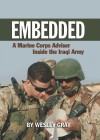Embedded: A Marine Corps Adviser Inside the Iraqi Army
Written by: Wesley R Gray,
Naval Institute Press, Annapolis, 2009,
ISBN 9781591143406, 272pp
Reviewed by: Graeme Sligo, Australian Army
Second Lieutenant Wesley Gray was a young Marine at Okinawa in 2006 when told he was being posted—at short notice—to Anbar Province to advise and train members of the Iraqi Army. It was a seven month tour. When Gray arrived, in July 2006, the insurgency was at a critical stage. The Golden Mosque bombing that year had been the catalyst for Sunni-Shia violence in Baghdad and other areas. This was characterised in the cities by mass-casualty attacks and by campaigns of executions and killings. Gray served for four years on active duty with the Marines and is now completing his PhD at the University of Chicago.
Marines, being Marines, had selected the hottest, driest and most unpleasant sector of Iraq, Anbar Province, as part of their area of operations. Within the area were Marine units, together with Iraqi Army units. Predominantly desert, Anbar includes the cities of Fallujah and Ramadi, and the Haditha area. Anbar was and is primarily a Sunni Arab area. Some of the early actions of the 1920 rebellion against the British had occurred along the Euphrates where Anbar borders Syria, and later there was significant fighting against the British in Ramadi and Fallujah.
Critical to the region is the Euphrates River, and Gray’s adviser team is stationed near the Haditha Dam. Lake Qadisiyah and the Haditha Dam is the second largest electricity production plant in Iraq. During his tour, his team—a Military Transition Team—is advising a predominantly Shia Iraqi Army Battalion. As Gray remarks, the advisory effort is vital, as it is aimed at improving the Iraqi Army so it can take over security from the US and Coalition forces. Gray’s period was before the major effect of the Sons of Iraq, the tribal forces in Anbar. These tribal forces helped to change the security situation in 2007-08.
The book is a very honest tactical-level view of the war. It is not a strategic survey or a popular history of the Iraq insurgency. It contains some errors: the Euphrates River is incorrectly described as slicing ‘straight through the heart of the city [of Baghdad]’ (page 13). However, the author did spend his tour in the provinces rather than the capital. The book does not attempt to discuss the substantive issues on US Marines and the Haditha killings in 2005, although there are some references to the affair.
Gray’s perspective is sharpened by his Arabic language skills and his insights into Iraqi culture. The book is at its best when it describes frankly the observations of Iraqi officers and US-Iraqi interpreters. It becomes clear to Gray that the Iraqis have a radically different world-view from the US advisers. Gray has an affinity with and liked the Iraqis. However, one experienced interpreter commented to Gray on the US presence, that for Iraqis, ‘the concept that somebody would actually want to help another person without some material benefit is ridiculous’ and that ‘violence is how politics and policy are solved in Iraq’. The book discusses the Western desire to be ‘efficient’. It contrasts this with the benefits, when advising local forces, of supporting and accommodating the Iraqis in some degree, and trying to ‘win over’ the Iraqi unit.
The Iraqis are very critical of US policy and its execution. There are some clear criticisms in this book on Iraqi Army practices (including logistics). The book also discusses some of the ethical issues involved when a US adviser has to intervene in tactical questioning of detainees by the Iraqi Army.
Gray realises that, as an adviser, the Iraqis have to be allowed to develop in their own way. He also realises the importance of tact and ‘face’ when trying to persuade the Iraqi command chain to carry out missions in a professional manner.
Embedded is a well-written description of what it was like to be an adviser to an Iraqi Army field unit in Anbar Province. It is recommended reading for those interested in the Iraq war, and for those intending to advise local forces in other military conflicts.

